|
Sweet Meadows Farm is a small permaculture homestead on 12 acres in both South Burlington, Vermont and another experimental farm in the rolling hills of middle Tennessee that specializes in breeding registered ADGA/AGS Nigerian Dwarf goats. Valerie and Hannah are a mother/daughter duo who are very passionate about the Nigerian Dwarf goat breed. In December 2012, our herd tested free of CAE, CL and Johne's. We re-tested in 2014, 2016, 2019, 2021 and again in June 2022 with negative results for CAE, CL, Johne's and Brucellosis. We utilize beyond organic practices in growing food and our focus is on regenerative farming and utilizing the natural processes that our Maker provided us with when he created the earth. Our Vermont farm is a slice of heaven with its double rainbows and four leaf clovers everywhere.
The rest of the farm clan includes our original older four kitties (Callie, Aslan, Shadow & Phoebe), little Annie the farm dog, our two Holland Lop bunnies Binky & Blueberry, and now two additional rescue cats Soot & Fern. All of our animals are loved and doted on heavily by us, our children, and many visiting friends and their families. Our goat kids are raised alongside our cats, dog, bunnies, and other animals and are quite used to being around them and act more like puppy dogs than goats! |
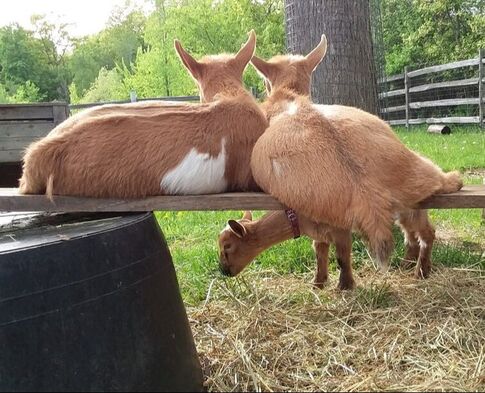
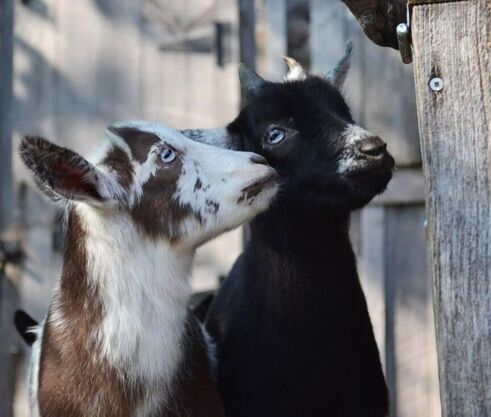
|
While conventional medicine always has its place on a farm, we only use it when we feel natural medicine options have all been exhausted as we feel natural interventions are better for the health of every animal. We practice homeopathy that follows both classical and Banerji protocols, and I am always learning something new as a student of Joette Calabrese who has studied directly under the Banerjis in India. We also incorporate the use of medicinal herbs and DoTerra essential oils on both our animals and family. All of these supports, and God's grace, played a huge role in the healing of my thyroid - I went off of medication for both hypothyroidism and hashimotos after being on it for over 13 years and have slowly reversed both conditions. We've seen miraculous healing across the board for many different illnesses or conditions, and I continue to be amazed at the natural gift of healing that is available to us. Our goats even take homeopathic remedies right off of our hand! For our farm animals, we also utilize Molly's Herbals, Fir Meadows, raw garlic, colloidal silver, raw ACV and many other herbs for general immune support, parasite control, and during pregnancy, during lactation, and when a goat just seems a little "off." Everyone is super healthy and our fecal tests prove it!
Regarding vaccines, we will only offer tetanus antitoxin to wethers when they are banded as the banding site is more susceptible to infection, and only at the request of the buyer. We do not give CDT or routinely vaccinate as we manage our herd holistically with Chaffhaye, herbs, garlic, homeopathy, essential oils, and various other things. We have managed our herd this way for over ten years now, and everyone is extremely healthy - we do not have cases of the normal diseases like coccidia that you see on farms as our kids are started on herbal wormers at two weeks of age and are treated weekly with one herbal wormer, and every three weeks with a heavy duty herbal wormer until they are six months of age and then switch over to our adult schedule. In our experience, goats that we have brought in that have been routinely vaccinated and chemically wormed are far more prone to long term immune issues, chronic diseases and skin issues. They develop resistance to bacteria and viruses, and require a lot more treatments and ongoing chemical inputs than naturally raised goats. Our first goat kids that we brought in were all bottle fed and vaccinated and were very thin, bloated and unhealthy, with chronic parasitic infections and skin issues that took a long time to resolve. We eventually sold all of those lines and really started to give more careful thought about the lines and also the breeders we were buying from, trying to buy from those whose values align with our own. We work closely with our wonderful large animal vet if an issue arises, but most of the time we are able to heal an issue naturally on the farm. |
So do not fear, for I am with you; do not be dismayed, for I am your God. I will strengthen you and help you; I will uphold you with my righteous right hand. Isaiah 41:10
God is at the center of our farm, and we pray over our farm and animals and know that they are all in His loving care. He is the ultimate physician and healer, and we put all of our trust in Him always.
Our farm is under His care. Sweet Meadows Sing Hallelujah
|
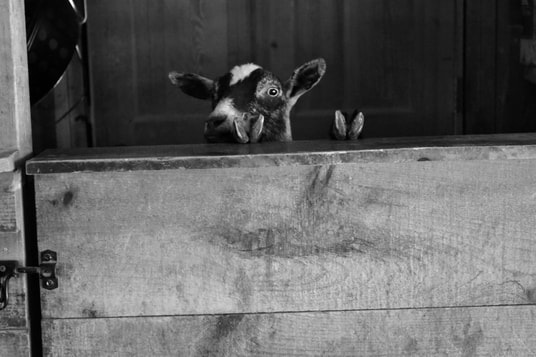
|
Our longer term goals include goat/bunny "farm" therapy, coaching families on raising goats, chickens & rabbits, homesteading & permaculture classes (including classes on fermenting sauerkraut & kombucha), community events, farm tours, a farm store, a creamery with classes on cheese making, kefir & fermented dairy foods, a kombucha company, and much more! Can't wait to see how God will be working on our farm!
|
In addition to raising Nigerian Dwarf goats, we also grow a large variety of both culinary and medicinal herbs, perennials, vegetables and fruits utilizing permaculture methods. We never use chemicals of any kind on our land or plants. While we have been doing this on a smaller scale so far, our goal is to expand and be able to sell to the outside at some point. In the summer months, we have several different varieties of raspberries, blackberries and blueberries. We also grow black raspberries, strawberries, honey berries, grapes, seaberries, gooseberries, elderberries, aronia berries, juneberries, josta berries and champagne/red/black currents. Our cherry plum trees line our raised bed gardens area and their fruits make the most wonderful jams to be put up for winter! We also have sweet & sour cherries, pears, shipova, quince, peaches, plums and apples. We have hazelnuts as well, but they are slow growing! Our favorite herb to grow is Thai Basil and we grow a LOT of it! We also grow herbs including rosemary, basil, thyme, chamomile, savory, cilantro, oregano, lemon balm, peppermint and many others! And of course all kinds of veggies such as tomatoes, onions, potatoes, broccoli, carrots, kale, lettuces and many others. Our goats LOVE getting food from our own yard! One time they let themselves out of their pasture and ate several raspberry bushes! It would take a lot more than that though to kill raspberries and their thousands of runners!
|
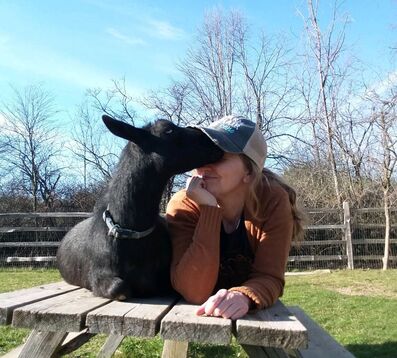
|
Hannah is half of the farm. She graduated from high school in 2022. She has a gift, and is known to be an animal whisperer - her patience and presence with animals is nothing short of remarkable. She plays a big role on our farm as our farm manager, assisting in all day to day duties, hoof trimmings and routine care, pregnancy care and delivery of kids, and is our farm contact for bringing in new genetics and lines. Her gift with photography is seen throughout our website and FB/IG page. Her gorgeous photos made the cover of Stone Soup Magazine four times between the ages of 11-13, including a cover with one of our goats! After graduating from high school in the summer of 2022, she rescued and fostered cats from many different bad situations and placed them in loving homes in New England. Together, with our combined photography, we are also working on a new greeting card project called The Simple Life that will benefit the Lord's Kingdom work. Stay tuned for more soon!
|
God is within her, she will not fall. - Psalm 46:5
|
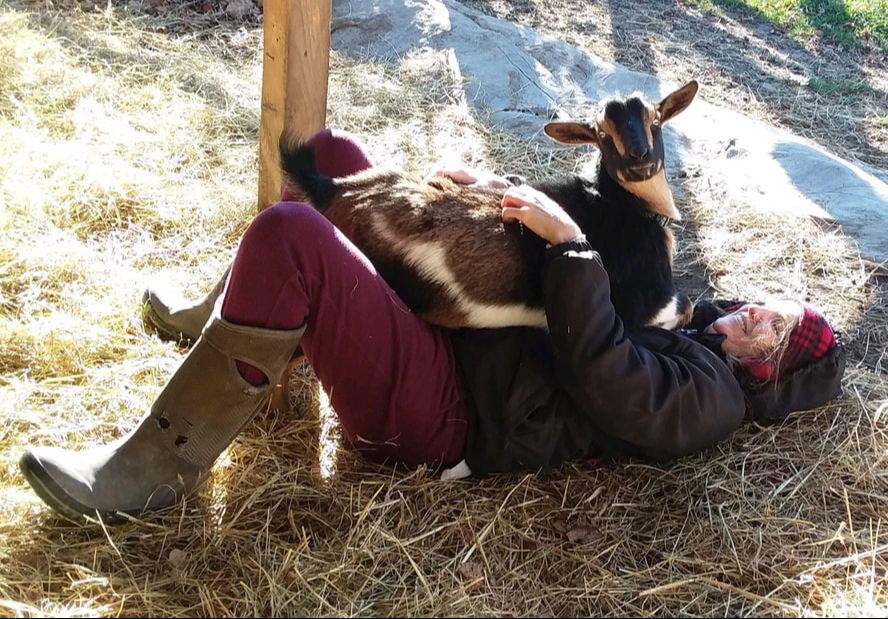
|
Be dressed ready for service and keep your lamps burning, like servants waiting for their master to return from a wedding banquet, so that when he comes and knocks they can immediately open the door for him. - Luke 12:35-36
|
